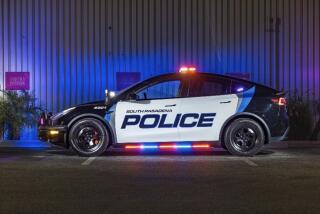Volkswagen Beetle Lovers Might Get a Charge Out of This One
- Share via
The lime-green VW Bug squatted in the middle of the electric-vehicle parking area, as conspicuously out of place as a fat cockroach in the center of a snow-white linen tablecloth.
Obviously a joker pulling a fast one on the parking police at the crowded MainPlace/Santa Ana mall by sticking the electric charger plug under the 2000 New Beetle’s gasoline filler cover.
But no.
A closer inspection revealed that it was, indeed, an electric Beetle.
A prototype, as it turns out, built by AC Propulsion in San Dimas under a hush-hush contract with German auto giant Volkswagen.
Alec Brooks, a vice president at AC, which specializes in electric propulsion, confirmed the project but said the company could not discuss it.
And officials at Volkswagen of America Inc. did not respond to requests for an interview about the electric Bug.
So details are scarce, but this much is known:
VW has retained AC--whose founder, Alan Cocconi, helped design a prototype that led to General Motors Corp.’s EV1 electric car--to develop a battery-powered Beetle.
The prototype seen at the mall was a second-generation version using relatively inexpensive lead-acid batteries. The driver said he had been averaging 70 miles on a full charge and that the car, though heavier than a gasoline-powered Beetle, had plenty of power.
Other than the power-monitoring instruments in the center console and a set of expensive thin-shelled aftermarket racing seats installed to make more room for the under-seat battery pack, the prototype looked like a stock New Beetle--except for the thick, black cable snaking out of the charge port installed in the right-rear fender.
*
The project with AC Propulsion is not a guarantee that VW will go ahead with a production model, but the company’s interest at a time when many auto makers have publicly turned their backs on rechargeable electric cars “is heartening” and probably the result of California’s zero-emissions vehicle mandate, said Ron Cogan, editor of the Green Car Journal in San Luis Obispo.
The so-called ZEV mandate, scheduled to take effect in the 2003 model year, would require auto makers with significant sales in California to certify a small percentage of their passenger cars and trucks as zero-emissions vehicles--a classification that, so far, can be attained only by battery-powered electric vehicles.
The mandate, which has been under review this summer, has come under fire from the major auto makers, including even those that have produced limited numbers of battery-powered cars and trucks, such as GM, Honda Motor Co. and Toyota Motor Corp. They say their experience so far has been that they cannot sell the general public on the vehicles because of concerns over cost; the availability of recharging facilities; and limited driving range of 60 to 120 miles per charge, far less than people expect from a tank of gasoline.
ZEV backers counter that most drivers average only about 50 miles a day and that plugging a car into a home charger every night guarantees a full charge each morning and eliminates most of the perceived inconvenience. And though electric vehicles are costly--lease rates approximate those for luxury cars--they need almost no maintenance and have minimal fuel costs. Electricity is free, in fact, at several hundred public charging stations in locations such as MainPlace, Los Angeles International Airport and selected Costco and Wal-Mart stores.
“What auto makers really are saying isn’t that they can’t make electric cars, but that they don’t want the state to make them do it, because it takes more effort to market them and to educate people about them,” said David L. Modisette, executive director of the California Electric Transportation Coalition in Sacramento.
“But even as they are doing negative marketing here, work on electrics continues around the world,” he said. Ford Motor Co., for example, just launched an electric version of its Ka mini-car in Europe, and will introduce a two-seat electric commuter vehicle, the Think City car, in the U.S in 2002.
VW’s pilot project, Modisette said, clearly shows that auto makers are not going to stop development of electrics, whether out of fear of being shut out of the California market if the ZEV mandate withstands industry opposition, or fear that a competitor will make a technology or marketing breakthrough that opens the market to electrics.
*
Times staff writer John O’Dell covers the auto industry for Highway 1 and the Business section. He can be reached at john.odell@latimes.com.






